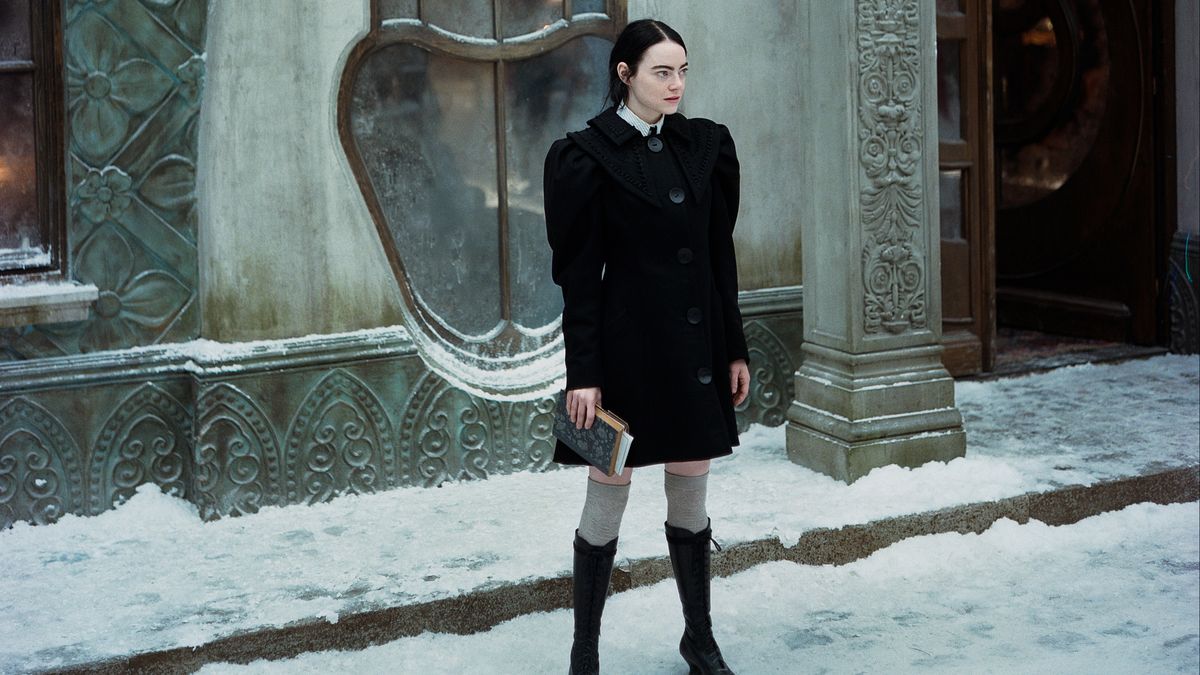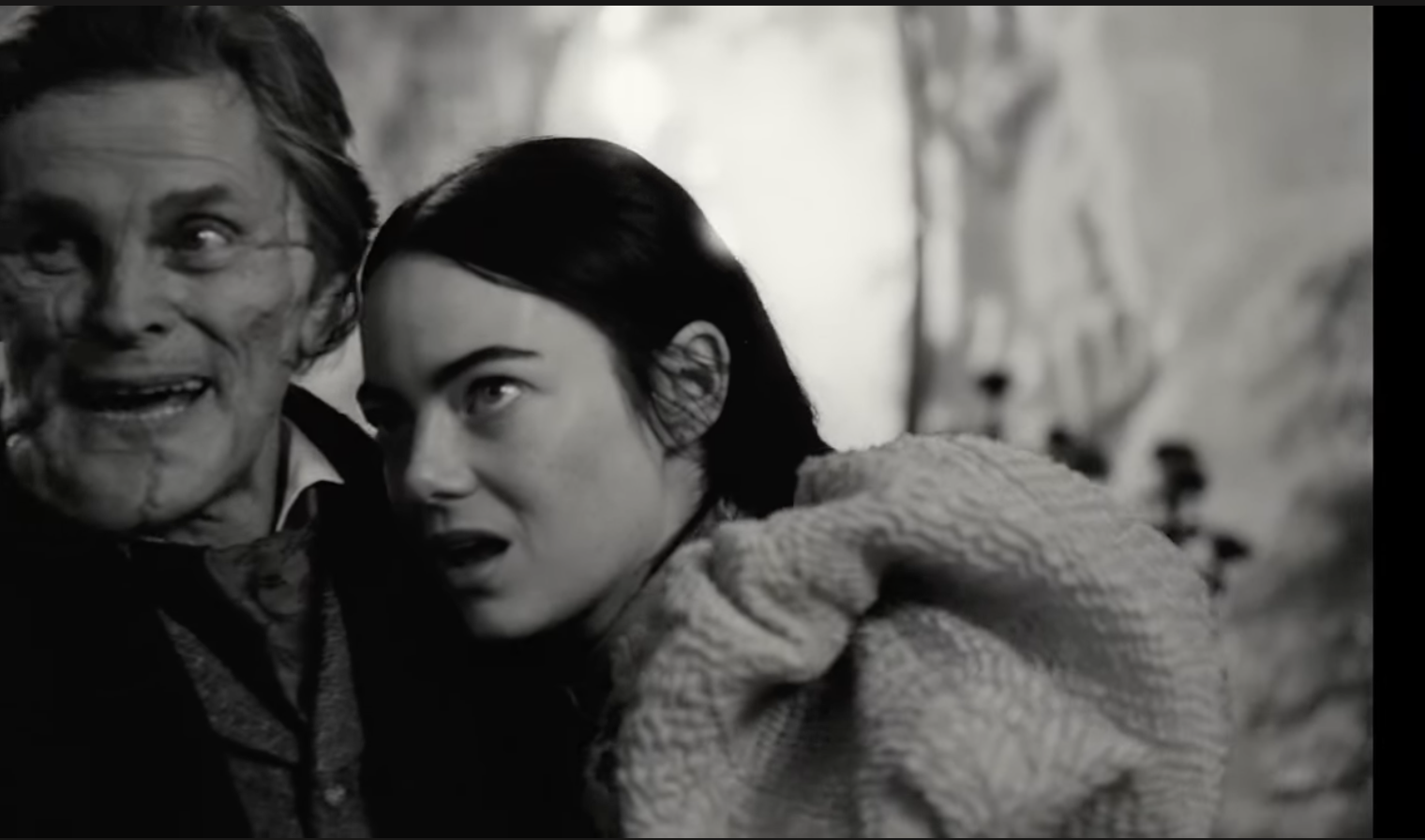
POOR THINGS
Film
Film by Yorgos Lanthimos
Review written by Grant Hirsch
‘Poor Things’, the latest film from Greek director Yorgos Lanthimos, continues Lanthimos’ streak in the genre of great films that will make your parents say, “that was too weird for me.” Consisting of a career-peak performance from Emma Stone, intricate world-building in both full color and black & white, and plenty of sex, Poor Things is an absolute joy to experience from start to finish. Come for the slapstick humor and chicken-dog hybrids, stay for the tale of a woman finding her own way in a world designed to keep her trapped.

Teaming up with Lanthimos once again after the highly praised The Favourite from 2018, Stone excels in the role of Bella Baxter, a woman with the brain of an infant who has been given a new chance at life by deformed scientist Godwin Baxter, played with much empathy by Willem Dafoe. Screens have been graced with modern adaptations of Mary Shelley’s Frankenstein for years (thoughts and prayers to I, Frankenstein, the flagship flop of 2014’s box office), though few have been able to transcend the plot and themes of the source material. In Poor Things, Stone’s characterization of Bella Baxter is played out to a tee, with no aspect of Bella’s personality unchecked. Physicality, speech, hopes, dreams, and fears are all accounted for, allowing Stone to play the character with seemingly such ease that viewers are enraptured from the moment she starts bumbling her way through life. The performance requires a level of preparation that fellow actors can only dream of achieving, while non actors can hardly even grasp the lengths it must take to shine in a role like Bella Baxter.

Lanthimos’ steampunk version of Victorian-era London is a feast for the eyes and ears. His highest budget picture yet at $35 million, Lanthimos is wholly able to physically realize the type of world necessary for such a robust storyline. Filmed almost entirely on constructed soundstages, not only are the players of the story able to connect on a deeper level with the world around them, but viewers can too. Years of CGI and green-screened sets in the name of “world-building” have desensitized audiences to the power of great production value. In Poor Things, something as simple as watching Bella stuff an entire pastry in her mouth on the beaches of Ibiza can hold the same cinematic value as Alec Guiness trekking across the desert sands in Lawrence of Arabia. When actors can actually exist in the space they take up, everybody wins. In addition, the costumes designed by Holly Waddington, a take on the traditional garments of the Victorian era combined with the high-concept fashion worn by Capitol members in The Hunger Games franchise, take on a life of their own, further cementing the world of Bella Baxter.

The supporting characters Bella encounters on her journey generously add to the weird and wonderful world of the film. Highlights include Comedian Ramy Youseff as Max McCandles with an adorably imperfect English accent, Mark Ruffalo at his most outlandish as the womanizing scoundrel Duncan Wedderburn, and stage veteran Kathryn Hunter as brothel owner Madame Swiney. Each character is instrumental in Bella’s journey, and every performance necessary in the progression of the film.
Similar to how one can draw a through line of Bella’s journey from “infant” to adult, one can also conjure a through line of Lanthimos’ earliest work to Poor Things. Themes such as generational trauma, isolationism, and sexuality can be traced back all the way to Lanthimos’ breakout film Dogtooth from 2009. It’s a fascinating peek into the mind of Lanthimos and where his interest lies, in addition to showing that these motifs can be explored again and again in completely different contexts.

It’s fitting that Bella Baxter constantly touts “progress” as the ultimate goal of mankind, as the pace of Poor Things keeps Bella and audiences alike on their toes, adding layer upon layer to the foundation established within Godwin’s home early on. This progress is only somewhat displaced by the inclusion of a short section towards the end of the film, where we meet Christopher Abbott’s Alfie Blessington, a nefarious figure from Bella’s past. While the tense segment answers questions scattered through the film about Bella’s original identity, it interrupts the smooth flow of events we’ve become accustomed to in Bella’s odyssey to self-realization. By no means does it derail the film, but it does extend its welcome by maybe fifteen minutes.
Nonetheless, Poor Things accomplishes a rare goal in film where it is a landmark achievement for everyone involved. In a world filled to the brim with activity that would give an episode of Bojack Horseman a run for its money, every aspect of the film was constructed from nothing but a great passion to tell the story of Bella Baxter as authentically as possible. Poor Things is an absolute success and a riot of a picture that absolutely deserves to be seen on the big screen. Reinventing the concept of a sex-comedy, the film will leave audiences counting down the days until the next collaboration between new dynamic duo Lanthimos and Stone.

